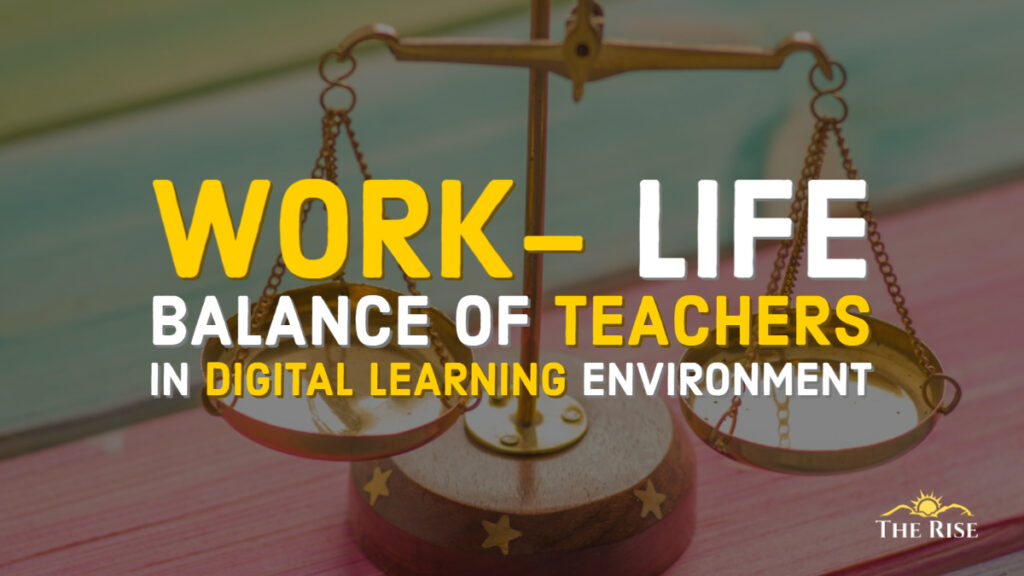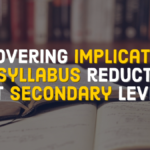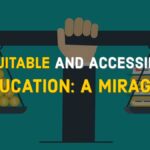The otherwise distinct work and life domains now appear to have smudged boundaries. Consequently, digital learning environments have thrown a challenge of work-life balance to the teachers. Teachers, being the sculptors of future generations, should take necessary precautions and strike a healthy work-life balance alongwith inculcating a similar sense in students through their actions.
The education sector across the world has been worst affected due to COVID-19 on the account of sudden disruption, initially, and the subsequent shift to online education. This sector handles human beings in their formative age. Therefore, the efficient utilization of this time in the life span of every individual becomes very critical. The education sector has so far been quite prudent in utilizing the technological options to negotiate the onslaught of COVID-19 induced lockdowns, physical distancing, travel restrictions, etc.. Numerous digital platforms to carry out teaching-learning processes remotely have emerged and are being extensively used by the education sector at all levels. However, the efficacy of teaching-learning processes and the implications of continuous online activities for longer durations on the life of teachers and students are yet to be assessed.
There cannot be any substitute for the on-campus face-to-face teaching.
Despite the digital divide and limitations of IT resources, online education has emerged as a saviour for those who can afford it. However, the limitations of universal & equitable access to all have been a cause of concern for all. Be it school, college, or university, online education is considered as the only alternative to keep the teaching processes rolling irrespective of the quality considerations in it. There can not be any substitute for the on-campus face-to-face teaching. Also, teachers have been confronting a lot of pedagogical issues in this remote mode of online teaching. Nevertheless, online teaching activities have kept students engaged as well as away from any void in their minds which might create severe psychological aberrations.
With the indulgence of educational institutions in online teaching, it becomes imperative to evaluate the implications of the use of Information and Communication Technology (ICT) by teachers in performing their tasks. The paradigm shift in the teaching approach has driven teachers for creating/compiling interactive course contents, sharing with students, and evolving suitable interaction pathways to maximize student learning.
Also read: Is Online Learning Deleterious for Kids?
There have been instances of absence of the educational institution’s support and compensation in ICT based online teaching to teachers, but the teachers have been responsibly benevolent enough to invest their time, money, and efforts together to realize it to the extent possible.
There are no formal working hours now. Anyone can make a digital intervention any time and expect its disposal on a real-time basis.
ICT emerging as a solution for work-from-home has broken the time boundaries and amalgamated the working hours with personal time. There are no formal ‘9 to 5’ working hours now. Anyone can make a digital intervention any time and expect its disposal on a real-time basis. This stretching of working time into personal time has offered flexibility but squeezed the time available for meeting personal and other commitments. The otherwise distinct work and life domains now appear to have smudged boundaries. Consequently, digital learning environments have thrown a challenge of work-life balance to the teachers.
Also Read: Don’t Compromise on Quality Education While Formulating Contingency Plans
The well-being of the users of the digital learning environment should be taken care of at all levels by restricting the time of working in it.
In the dawn of digital age, the work-life balance of teachers is of larger concern due to the inability of younger generations i.e. students, to remain confined to stringent timelines for interactions. Thence, the work-life balance of teachers should be given needful attention by the academic governance and regulators. The expectation of performance from teachers, facilitation by the system for creating and managing the digital learning environment along with expectations of the society and social obligations are the key factors seeking interventions for striking the work-life balance of teachers. The well-being of the users of the digital learning environment should be taken care of at all levels by restricting the time of working in it.
Also Read: Peeping into Miseries of Teachers
Teachers should not indulge in role conflicts in work and life domains. Rather, they should discipline themselves for satisfying the work and home needs while ensuring life satisfaction, work satisfaction, and well-being.
Teachers should not indulge in role conflicts in work and life domains, rather discipline themselves for satisfying the work and home needs while ensuring life satisfaction, work satisfaction, and well being. Other factors influencing the individual’s strategy for work-life balance should align with the work orientation, personality, energy level, personal control, adjustment capabilities, gender, age, life, and the stage of career. Therefore, the teachers being the sculptors of future generations, should take necessary precautions and strike a healthy work-life balance and also inculcate a similar sense in students through their actions.
Disclaimer: The views expressed in this article are of the author solely. TheRise.co.in neither endorses nor is responsible for them.
About the author
Prof. Onkar Singh is the former Vice Chancellor of Veer Madho Singh Bhandari Uttarakhand Technical University, Dehradun, He has been the Founder Vice-Chancellor of the Madan Mohan Malaviya University of Technology, Gorakhpur (U.P.). He is a Professor of Mechanical Engineering at Harcourt Butler Technical University, Kanpur (U.P.).








































Well said
Pingback: Disordered Education Burdens Learners - TheRise.co.in
Pingback: Technological Transformation in Higher Education - TheRise.co.in